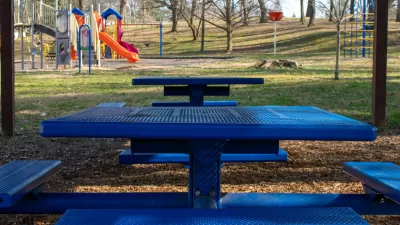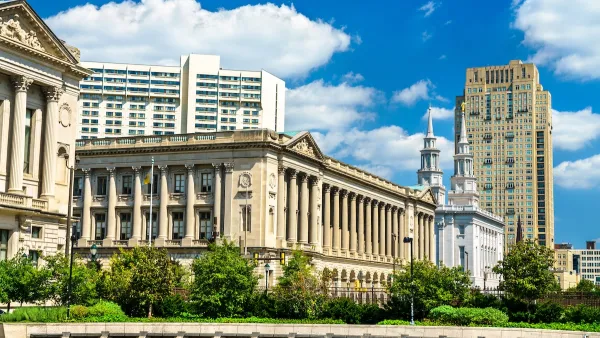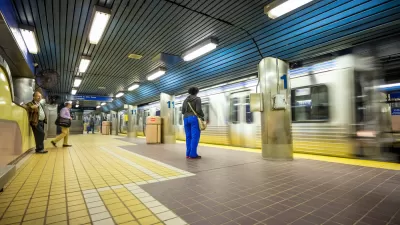As free-range children become an increasingly rare species, designers and psychologist are also questioning the effects of the sterile, innocuous playgrounds currently in fashion. How can play, and kids, get liberated again?
According to a new column by Philadelphia Inquirer Architecture Critic Inga Saffron, "psychologists and designers are starting to question the value of what they call 'the playground in a box,' the factory-made, cookie-cutter climbing frames that dominate schoolyards and parks across the country."
Saffron cites the arguments of Susan G. Solomon's new book, The Science of Play, summed up in the article by Saffron: "Character-building adventure and imaginative play take a backseat to liability concerns. On top of that, she says, the equipment is expensive, making it hard for towns to keep up with the demand for play spaces."
Given the dearth of playgrounds in many neighborhoods in Philadelphia (or, for that matter, thousands of other cities around the country) and the ideas presented in Solomon's book, Saffron proposes an alternative approach to playgrounds. "What if the city ditched plans for new forts and opted instead for something rougher and more ad hoc, say, the playground equivalent of the pop-up beer gardens that have been so successful?"
Saffron goes on to describe more of the support (including the work of the Natural Learning Initiative) behind Solomon's approach to playgrounds. The article also includes the details of what such a playground would look like, most clearly exemplified in Philadelphia by Sister Cities Park, designed by Studio/Bryan Hanes.
FULL STORY: Changing Skyline: Redesigning playgrounds to promote 'loose play'

Maui's Vacation Rental Debate Turns Ugly
Verbal attacks, misinformation campaigns and fistfights plague a high-stakes debate to convert thousands of vacation rentals into long-term housing.

Planetizen Federal Action Tracker
A weekly monitor of how Trump’s orders and actions are impacting planners and planning in America.

Chicago’s Ghost Rails
Just beneath the surface of the modern city lie the remnants of its expansive early 20th-century streetcar system.

Bend, Oregon Zoning Reforms Prioritize Small-Scale Housing
The city altered its zoning code to allow multi-family housing and eliminated parking mandates citywide.

Amtrak Cutting Jobs, Funding to High-Speed Rail
The agency plans to cut 10 percent of its workforce and has confirmed it will not fund new high-speed rail projects.

LA Denies Basic Services to Unhoused Residents
The city has repeatedly failed to respond to requests for trash pickup at encampment sites, and eliminated a program that provided mobile showers and toilets.
Urban Design for Planners 1: Software Tools
This six-course series explores essential urban design concepts using open source software and equips planners with the tools they need to participate fully in the urban design process.
Planning for Universal Design
Learn the tools for implementing Universal Design in planning regulations.
planning NEXT
Appalachian Highlands Housing Partners
Mpact (founded as Rail~Volution)
City of Camden Redevelopment Agency
City of Astoria
City of Portland
City of Laramie





























